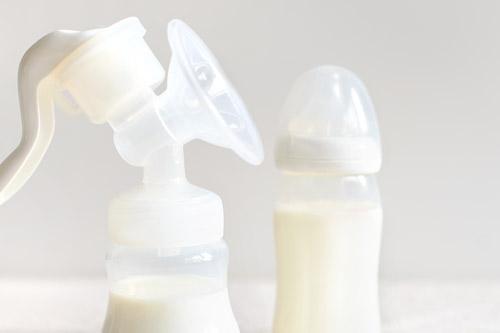Engorgement
Learn what engorgement is—and how to treat it.
Español
It's normal for your breasts to feel different after your baby is born. They are making milk and have extra blood flow, so they may feel tender and full. But if your breasts are warm, hard, and painful, they may be too full of milk, or engorged. If you think your breasts are engorged, speak with your WIC breastfeeding staff.

Causes of Engorgement
Engorgement happens when milk isn't fully removed from your breast. It can happen any time, but it's most likely to happen:
- As your milk transitions from colostrum to mature milk.
- If there are sudden changes in how often you nurse, such as skipping a few feedings or pumping sessions.
Signs of Engorgement
If your breasts are engorged, they may be hard, full, warm, tender, and painful, and you may have a low-grade fever. It may also be hard for your baby to latch.
Preventing Engorgement
Engorgement is uncomfortable, and it can lead to other issues like plugged ducts or a breast infection. It also can slow or lower your milk supply, because your body is not getting the message to make more milk. Breastfeeding or expressing milk every 2-3 hours and taking good care of yourself can help prevent engorgement.
Breastfeed Often
- Breastfeed your baby often in the early weeks, 8-12 times in 24 hours.
- Make sure your baby latches well to ensure baby can remove milk effectively.
- Consider avoiding pacifiers and other artificial nipples until you and baby are comfortable and breastfeeding is going well. That will help regulate your milk supply.
- If you are going back to work or school, express milk frequently and at regular intervals while you and baby are apart.
Take Care of Yourself
- Eat well, drink plenty of fluids (especially water), and get enough sleep.
Relief for Engorgement
For most moms, engorgement usually goes away in a few days with these tips:
- Breastfeed first from the engorged breast.
- Before feedings, encourage your milk flow. Put a warm, moist washcloth on your breasts or take a warm shower for 10-20 minutes.
- Massage your breasts before and during feedings, moving from the chest wall to the nipple.
- If your breast is hard, hand express or pump a little milk before nursing. That will soften your breast and make it easier for your baby to latch. Be sure to only express enough milk to soften your breasts or provide comfort. If you express too much milk, you may encourage milk production and keep getting engorged.
- Between feedings, put cold compresses on your breasts to help reduce swelling and pain.
Oversupply of Milk
Some moms make more milk than their baby needs. This is called oversupply. It can cause frequent engorgement and fast milk flow. It can make it hard for your baby to nurse. If you think you might be making too much milk, talk to your doctor or your WIC breastfeeding expert.
 Where to Find Help
Where to Find Help
Your local WIC breastfeeding staff can help you relieve engorgement. They can also give you tips to prevent it.











